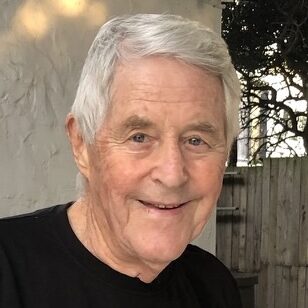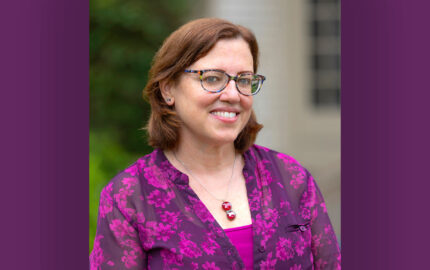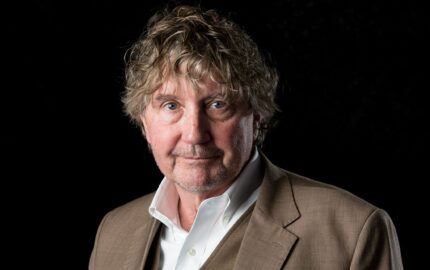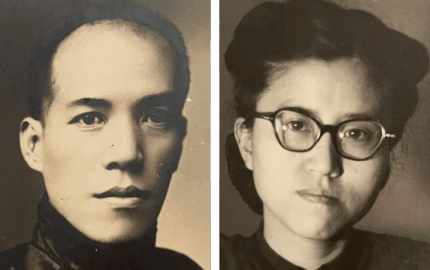An appreciation by Pippa Green, NF ’99, adapted from a citation presented to Tony Heard when he received the 2022 Allan Kirkland Soga Lifetime Achievement Award for his contribution as a journalist in exposing the apartheid state
Anthony (Tony) Heard, the former editor of the Cape Times in South Africa, who defied apartheid restrictions to publish an interview in 1985 with the then banned leader of the prohibited African National Congress, died in Cape Town on March 27, 2024, at the age of 86.
He was a Nieman Fellow in the class of 1988.
At the height of the most violent period in South Africa, during the last decade of apartheid, the government increasingly clamped down on the media. But some voices had already been prohibited from being heard for 25 years. One was that of Oliver Tambo, the exiled leader of the African National Congress (ANC), the leading party in the liberation movement.
The country strained under unbearable tension. There was effectively a civil war, human rights were being violated daily and the imposition of financial sanctions against apartheid weighed heavily on an ailing economy.
In all this, the government of P.W. Botha, which relied on continued white support, had to convince the white population that the ANC was a dire enemy that would threaten its existence.
But the ANC could not answer this charge as the media – and everyone else – were prohibited from quoting its leaders.
It was in this atmosphere, in November 1985, that Heard, then editor of the Cape Times, traveled to London to seek out Oliver Tambo. John Battersby, then the London correspondent for South African Associated Newspapers (SAAN, the company that owned the Cape Times), had suggested the time was right for such an interview.
With the help of Battersby and Frene Ginwala, then Tambo’s aide (who later became the first speaker of the National Assembly, South Africa’s post-apartheid parliament), he set up an interview with the ANC leader who had been living in exile for almost quarter of a century.
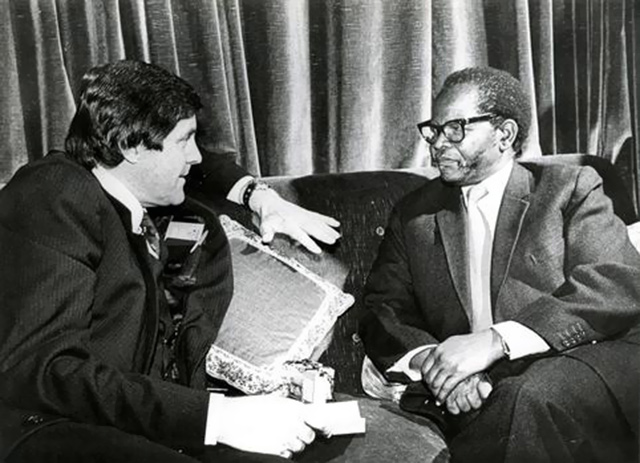
He interviewed him extensively — on the ANC’s position, its vision for the country and its attitude toward race. In the interview, Tambo made clear that the ANC was not fighting whites, but the system of apartheid. In fact, he stressed that the ANC’s vision for the country was of non-racialism.
It was precisely what the apartheid regime did not want its own constituency to hear.
Heard published the interview in full on the op-ed page with a prominent cross-reference on page 1 of the Cape Times. It caused a stir not only because it quoted Tambo; it brought to the people of South Africa the unfiltered views of one of the most important liberation leaders, not only in South Africa but in the world.
It was clear, Heard reflected later, that quoting Tambo was not a “mistake’ – as in a line slipped into a larger story. It was clear defiance of the stringent laws that constrained the media under apartheid.
The decision, though, he says, was not driven by politics but by journalism: it was about the need to inform South Africans.
Shortly thereafter, Heard received a written admonishment from the board of SAAN; a few days later he was arrested and charged under the Internal Security Act for quoting a banned person, an offense that carried a sentence of three-10 years. At the same time, the government tightened emergency regulations that restricted the media, banning reporters and photographers from all scenes of “unrest”.
Nonetheless, the Cape Times continued to highlight the violations undertaken at the hands of the police. One example was a case that came to be known as the “Gugulethu Seven”. In March 1986, seven young men were gunned down in Gugulethu, an African township near Cape Town. The police said the men, aged between 16 and 23, had been killed in a gun battle with police. But witnesses at a nearby migrant workers’ hostel told a different story to reporter Chris Bateman. They said police had effectively executed at least two of them, both unarmed, at point-blank range.
The newspaper ran the story of the eyewitness accounts across its front page, as well as the statement from the police that said there had been a “shoot-out” after a planned ambush of a police vehicle. Bateman’s colleague, reporter Tony Weaver, had followed up Bateman’s story for a BBC interview. The reporters and the Cape Times were charged. Bateman was issued with a Section 205 — an order forcing him to disclose the names of his eyewitnesses, all workers for a local dairy plant living in the nearby hostel. Weaver was acquitted a year later. Bateman did not reveal his sources to the police.
A subsequent forensic report found that all seven had been shot in the head at point-blank range. Years later, at the Truth and Reconciliation Commission, it was revealed that the police had set up the operation from the start, infiltrating the group and pushing them to “ambush” the police vehicle.
In Heard’s case regarding the Tambo interview, the company eventually paid a paltry R300 admission-of-guilt fine. But it also decided to fire him in 1987. He had worked for the Cape Times for 32 years and been editor for 16.
The company was out of sync, though, with other journalism organizations around the world. Heard received the Golden Pen Media Freedom Award and went on to be awarded a Nieman Fellowship at Harvard University in 1988.
A life devoted to journalism and public service
Heard was born in Johannesburg in 1937. After matriculating in 1954 from Durban Boys High, he went to London where he did a Pitman’s course in shorthand and typing — skills, he said, that stood him in good stead. He returned to South Africa and in 1955, joined the Cape Times. He studied part time at the University of Cape Town, graduating with a Bachelor of Arts followed by philosophy honors.
He remained at the paper, apart from a brief stint as Cape editor of the Financial Mail, until his dismissal.
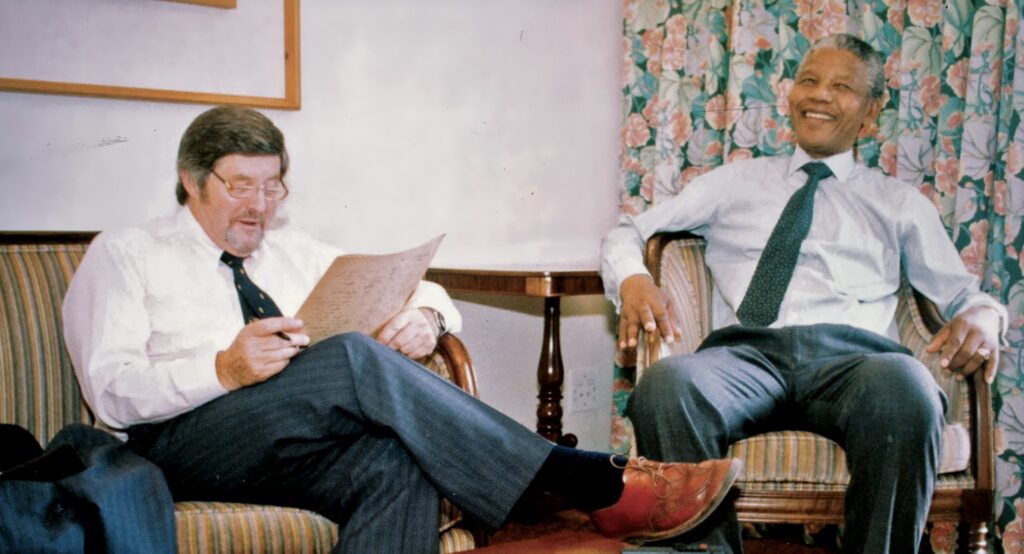
Shortly after the democratic transition he joined the Nelson Mandela administration as a senior official, first advising then Water Affairs minister Kader Asmal, later working in the presidency during the Mbeki administration.
Throughout — even as the new politicians grew less enamored with the media — he fought for the principles of media freedom and ethical and comprehensive journalism.
In addition to being selected for his Nieman Fellowship, Heard was a Visiting Fulbright Fellow at University of Arkansas in1989 and1992 and additionally spent months as a Wilson Center Public Policy Scholar in 2010.
He authored two books, “Cape of Storms: A Personal History of the Crisis in South Africa” and “8000 Days: Mandela, Mbeki and beyond — The inside story of an editor in the corridors of power.” In retirement was a frequent speaker and columnist on media issues and current affairs.
Shortly before his death, Heard completed his final draft of his third book, “Cost of Courage,” about his family’s lifetime search for answers to the mysterious disappearance of his father, George Heard, in 1945. Tony’s daughter Janet, also a journalist working at Daily Maverick and a Nieman Fellow in the class of 2010, plans to finish the book.
George Heard was a well-known anti-fascist political journalist who enlisted in the war against Hitler as a naval sea officer in 1942. The family has gathered documentation and reports over the years, discovering strong circumstantial evidence that George was murdered for his political beliefs.
Tony Heard’s mother, Vida Heard, was also a journalist.
Tony Heard is survived by his beloved partner Jane; his children Vicki, Janet, Pasqua and Dylan and their partners John, Steve, James and Emma; his brother Ray; grandchildren Jessica, Tyler and Ella, and other family members.
A statement from Tony Heard’s family
Tony was a fiercely independent thinker who has left an indelible footprint in journalism and beyond, with a lifelong commitment to non-racialism, media freedom and social justice. As a family, we mourn his passing and we thank him for his courage, his unwavering love, kindness, idealism and unique storytelling. He has caught his final wave, may he rest in peace.
Additional reading
On publishing the Oliver Tambo interview in 1985:
Articles by Tony Heard:
“Nieman Moments” recalled for the Nieman Foundation’s 75th anniversary in 2013:
